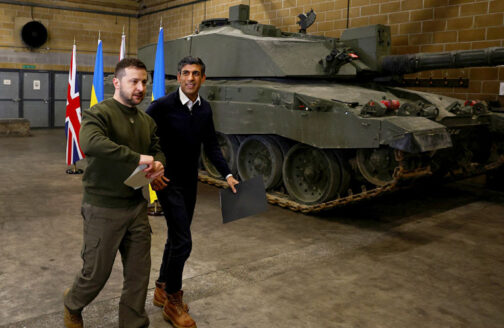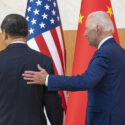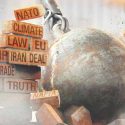Prevention possible
 Can’t spell Ukraine without UK: British Prime Minister Rishi Sunak and Ukrainian President Volodymyr Zelensky at a military facility in Lulworth, Dorset, England, Feb. 8, 2023.
Can’t spell Ukraine without UK: British Prime Minister Rishi Sunak and Ukrainian President Volodymyr Zelensky at a military facility in Lulworth, Dorset, England, Feb. 8, 2023.
Credit: picture alliance / ASSOCIATED PRESS | Peter Nicholls
The UK’s role in international security – doing more to understand and inhibit aggression
The arrival of Ukrainian President Volodymyr Zelensky in London on Feb. 8 was a demonstration of the leading role that the UK has played in Europe’s support for Ukraine and the international resistance to an expansionist Russia. The UK’s main partners in Europe have tended to find themselves led – sometimes reluctantly – by a committed United States and an enthusiastic United Kingdom. Former UK Prime Minister Boris Johnson has continued to visit Kyiv and drum up support for Ukraine’s application to join NATO and current Prime Minister Rishi Sunak was at the center of the visit and has now placed himself carefully in the vanguard of support. The Leader of the Opposition and the Labour Party, Sir Keir Starmer, has been thoroughly briefed and has consistently supported the government’s decisions in the war. Russia’s illegal war against Ukraine has not only united the West – and specifically NATO – but also the UK’s political parties, which would be considered in some circles to be an even more impressive feat.
Although support for Ukraine among the British population remains strong, it should not be taken for granted. The UK is going through more turbulent economic weather than many of its neighbors – undoubtedly as a result of the triple whammy of the war, Covid-19 and Brexit – in which the rising costs of living, triggering industrial action, are exacerbating its woes. Despite the war and new requirements, the defense budget is under continual strain and Defence Secretary Ben Wallace is having to make choices that place an increasing emphasis on technology and smart weaponry, and Russia’s behavior in Ukraine is further fueling that drive. Enhanced interoperability, speedier procurement and training across the forces of NATO allies and partners have always been understood to be important; now they are critical.
Since the decision to exit the European Union, the UK has been grappling with enormous change.
In March 2021, the UK set out its new approach to security, defense, development and foreign policy in the Integrated Review: “Global Britain in a competitive age,” accompanied by the Defence Command Paper and the Defence Industrial Strategy.
The analysis of the international competitive environment and the range of threats and insecurities within the Integrated Review (IR) were prescient. The IR identified Russia as the most acute threat to security in the Euro-Atlantic region and China’s growing international stature as the most significant geopolitical factor for the international order in the long term. The IR also addressed the changing nature and distribution of global power and identified four overarching, interconnected trends of particular importance:
- Geopolitical and geo-economic shifts – including the growing importance of the Indo-Pacific.
- Intensified systemic competition that is resulting in a growing contest over international rules, norms, values and behavior.
- Rapid technological change – including space, AI and quantum technologies.
- Transnational challenges such as climate change that threaten humanity’s shared security and require collective, multilateral cooperation.
The UK’s response to these threats is framed in the short and in the longer terms. In the long term, the UK has identified investment in science and technology as being fundamental to long-term capabilities and prosperity and has laid out the ambition to be one of the leading sci-tech countries. In the shorter term, the UK has focused on supporting Ukraine along with allies in preparation for further Russian aggression, including in cyber defense – a strategy that reaped significant dividends in helping fend off the many cyberattacks that have taken place in the last year or more as part of the Russian attacks.
In early 2023, the government will issue a “refresh” to the Integrated Review (and the accompanying Defence Command and Industrial Strategy papers) on the grounds that the challenges have grown. According to the House of Commons Foreign Affairs Committee: “While the blame for the war in Ukraine lies solely with Vladimir Putin, the failure of the West sufficiently to challenge Putin’s incursion into Georgia in 2008, his annexation of Crimea and parts of the Donbas in 2014 and his sponsorship of state murders in the UK in 2006 and 2018 undoubtedly emboldened him…. Greater and clearer-sighted prescience could also have enabled the UK and her allies to prepare better for the oil, gas and food supply problems that would inevitably result from a lengthy war in Ukraine, thereby weakening Putin’s hand….” The general sense is that the refresh will be an update based on lessons learned from recent events rather than a major overhaul.
The IR Refresh ought to examine what could have been done to help prevent the war. Of course, only the Putin government can be held to blame and to account for the illegal war against Ukraine, but it would be foolhardy not to consider what could have dissuaded Russia, for example: stronger, more resolute messaging so that Putin was not so falsely emboldened; more credible deterrence postures; more resilience – and communicated resilience – against energy shocks; and consequences for the murderous use of chemical and radiological weapons on UK territory.
Lessons from an analysis of what could have been done to prevent the war will help NATO, along with allies in other parts of the world that are ridden with violent conflict or that could be on the verge of war, to put measures in place that will help reduce the risks of and increase the barriers to outbreaks of major violence. Such analysis will also assist in ways to move forward if, and when, a ceasefire or peace treaty is agreed with Russia. The illegal invasions of Ukraine have demonstrated the importance of cooperation with European partners on regional security issues and, despite Brexit, the UK would be well positioned for closer cooperation with the EU and other European countries, through both mini-lateral and bilateral mechanisms.
The international community has been collecting and analyzing data on conflict and conflict prevention over decades. Like the medical world over a century ago, when disease prevention became part of the approach in which people could support their health, the international community is beginning to understand what would prevent war and, rather than wait until it erupts and only then seek impossible, urgent cures, measure what will likely decrease the urge to begin hostilities, continue a drawn-out conflict and help prevent the worst effects of war.
For example, NATO Allies are carefully attempting to calibrate the type and amount of military support they are supplying to Ukraine. Ukraine and Western states have adhered to international law and norms in terms of the types of weaponry they have employed and supplied – only Russia has used banned weapons such as cluster munitions and only Russia has made threats to use nuclear weapons. The decision to supply tanks has taken the best part of a year and there remains a great deal of caution over the requests from Ukraine to supply airpower. Manufacturing UK weapons in Ukraine under license could present a longer-term solution for Ukraine and this mechanism could be adopted by other countries. Drone warfare – both in terms of data collection and targeting as well as armed or explosive drones – has been a major feature of the war and this is likely to increase, as is the supply of data from satellites and the increasing role of outer space in the war.
In terms of surveillance, although China’s ambitions in terms of regional hegemony, military capabilities and geopolitics are increasingly clear, China is not characterized at the level of a “threat” to the UK. It is possible that this will be revised in the IR Refresh. China’s increasing hostility towards the status quo over Taiwan is increasing concerns about a regional conflict between two large nuclear armed states.
AUKUS – the new collaboration among Australia, the UK and the US – caused a major disturbance on its announcement in September 2021, as it involved the decision by Australia to end a contract for a French diesel-powered submarine in favor of a nuclear-powered submarine provided by the US and the UK. It is likely that announcements will be made in March 2023 regarding some of the key details of the submarine build – including the ways in which a non-proliferation element will be incorporated to ensure that nuclear materials cannot be diverted for purposes related to nuclear weaponry.
But the other aspects of AUKUS, specifically the commitment to collaborate on advanced technologies – such as cyber-tech, semi-conductors, space technologies, AI/machine learning and quantum technologies such as quantum sensors, quantum communications and quantum computing – have yet to be fully fleshed out in the public domain. Other economies, for example Japan and Korea, will likely want to participate in some aspects of AUKUS. New Zealand and Canada – for quite different reasons – will also be keen to see how their involvement in the Five Eyes alliance will impact AUKUS.
While beating back Russia and preventing a Europe-wide war that involves NATO and all the associated risks remains the urgent and therefore top priority for the UK, Europe and the trans-Atlantic alliance, understanding how to live with a highly energetic, perhaps domestically turbulent China should not be put off for later. Working out how to co-exist with a large, hostile military power in the Pacific is occupying a significant part of the US hive-mind. The UK will want to play its part with the US – as will Europe. Deterring China from active conflict, be it over Taiwan, DPRK, the South China Seas or even – in the longer run (but not as long as people might like to imagine) – the Arctic, will require an understanding of the ways in which China is thinking, how much it wants peaceful coexistence and how to persuade and dissuade for mutual gain. The US, Europe and the Atlantic Alliance failed to do just that with Russia – despite decades of operating in the same neighborhood, with overlapping cultures and languages. We must get better at the understanding and prevention part, or we won’t have a chance of succeeding with China.
PATRICIA LEWIS leads the International Security Programme at Chatham House, a London-based inter-national affairs think tank.




